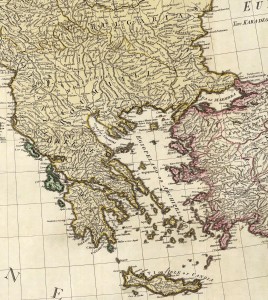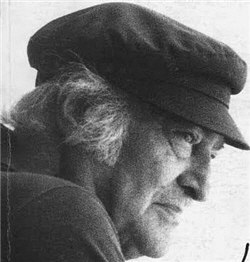Who, at the age of seventeen, was your favorite exponent of French surrealism? For the young Odysseus Elytis it was Paul Eluard. There is enough striking juxtaposition in this spiritual meeting to furnish André Breton’s Surrealist Manifesto with one more example of his tenants: Elytis was the scion of the well-known Alepoudelis family from Lesbos, whose fortune had been made in soap manufacturing, while Eluard was a tubercular young communist, even, benightedly, a Stalinist, risen from the working class, whose experiences during the First World War left him with a proper, and very French, revulsion for bourgeois values. Mooning bourgeois values was, of course, the surrealists’ raison d’etre. What was a privileged seventeen-year-old Greek boy doing with such incendiary stuff? The same thing, no doubt, that privileged seventeen-year-olds, at least those of a sensitive nature, have always done with incendiary stuff – recast it as surrogate parent to his own budding sensibility. I picture him, a tall skinny boy, stopping by an Athenian bookshop on his way home from school to pick up a copy of Capitale de la douleur, bringing it home, shutting himself in his room and quietly emoting over those poems of love, with there irrational color schemes, body parts transposed to other functions, adjectives intended for one order of nouns transferred to nouns of another order. Perhaps it would have been among the books that would travel with him to one of the Aegean islands, Hydra, Spetsai, Tinos, Mykonos, or Mytilene, where his family summered. Sitting in the shade of a rock, or sprawled leggily on a white washed terrace, he would read,
She is standing on my lids
And her hair is in my hair
She has the colour of my eye
She has the body of my hand
In my shade she is engulfed
As a stone against the sky

Elytis wrote of his sun-shot awakening as a poet and his discovery of the surrealist movement: “When my interest in poetry was first awakened, round the age of seventeen, I found myself in possession of a fund of experience acquired from my life in the islands; my imagination had developed among the rocks and the caiques – the small island boats – among the rectangular, whitewashed houses, and the windmills. The Aegean had indelibly stamped my consciousness. Thus provided, I could easily have started on a poetic career the sole aspiration of which would have been to reveal the Greece of sun and sea, and would have contented myself with that. But it so happened that, at this crucial moment, I became aware of the theories and the works of the revolutionary French movement of Surrealism. I read with passion all the books and magazines which came from Paris.”
What is surreal about this passage is the complete absence of any reference to what was transpiring in Greece at the time. In 1928, when Odysseus Alepoudelis was seventeen, Greece was still reeling from a calamitous war with Turkey over lands belonging to the Ottoman Empire. Not only had Greece lost the war, but the ensuing Treaty of Lausanne enforced a poplulation exchange which broke the back of Greece’s already beleaguered economy and drove ever deeper the divisions in its society. These divisions extended even to violent differences over the usage of the Greek language. In the following years, massive unrest led to an overthrow of the monarchy, a brief effort to build a republic (led by the revolutionary statesman, Eleftherios Venizelos, a friend of the Alepoudelis family) and the republic’s final dissolution.
The typical seventeen-year-old, if such exists, is bad at irony, especially when applied to his own life. Impossible to tell with what sense of irony young Odysseus stood at the crossing marked by his own privileged circumstances, the idealistic surrealists he so admired and who stood against everything his privilege embodied, and the wrenching struggle for existance in which his country was engaged. He must have had some sense of the dissonance because when, in 1939, he published his first volume of poems, he dropped his family name for a composite name, “Elytis”, reflecting attributes and values he evidently wished to arrogate to himself and his poems: Ellas, or “Greece”; elpidha, “hope”; eleftheria, “freedom”, and Eleni, a mythic personification of beauty and sensuality.
His first book of poems, Orientations, is flooded with images and gestures of hope, freedom, beauty, sensuality, and above all a fierce identification with Greece, a country which, to him, incarnates these attributes. The poems are frequently erotic, often celebrating the kore (the Greek word for maiden, but which layers that denotation with a broader sense of the feminine). And there are indeed vibrantly surrealistic images. Here, for example are the opening lines of “The Concert of Hyacinths”
Stand a little closer to the silence, and gather the hair of this night who dreams her body is naked. She has many horizons, many compasses, and a fate that tirelessly invalidates all her fifty-two cards every time. Afterward she begins again with something else — with your hand, to which she gives pearls so it may find desire, an islet of sleep.
 What cannot be found in this poetry is any trace of the national moment. In the poems he wrote before the Second World War and his shattering experience as a second lieutenant in the Albanian campaign against Mussolini’s forces, Greece is less a place than a holy idea. After the war, and his great long poem “Heroic and Elegaic Song for the Lost Second Lieutenant of the Albanian Campaign”, his poetry darkened. While retaining all the Aegean vibrancy his admirers have often taken for optimism, his poems opened to admit of melancholy and loss. But the first poems, published against an epoch of massive upheaval, are resolutely, some might say defiantly, lyrical outpourings of those qualities with which he lined his name. In this way, as in so many others, he is entirely unlike his exact contemporary, Czeslaw Milosz, who, from the outset was obsessed with the articulation of his national tragedy. The two poets won the Nobel Prize in successive years, Elytis in 1979, Milosz in 1980, making for a fascinating diptych of contrasting poetic sensibilities on the Swedish Academy’s roster.
What cannot be found in this poetry is any trace of the national moment. In the poems he wrote before the Second World War and his shattering experience as a second lieutenant in the Albanian campaign against Mussolini’s forces, Greece is less a place than a holy idea. After the war, and his great long poem “Heroic and Elegaic Song for the Lost Second Lieutenant of the Albanian Campaign”, his poetry darkened. While retaining all the Aegean vibrancy his admirers have often taken for optimism, his poems opened to admit of melancholy and loss. But the first poems, published against an epoch of massive upheaval, are resolutely, some might say defiantly, lyrical outpourings of those qualities with which he lined his name. In this way, as in so many others, he is entirely unlike his exact contemporary, Czeslaw Milosz, who, from the outset was obsessed with the articulation of his national tragedy. The two poets won the Nobel Prize in successive years, Elytis in 1979, Milosz in 1980, making for a fascinating diptych of contrasting poetic sensibilities on the Swedish Academy’s roster.
It would be wrong, however, to dis Elytis on grounds of non-engagement. Struggle and suffering brook divers responses. Elytis once said of his life’s work, “I consider poetry a source of innocence full of revolutionary forces. It is my mission to direct these forces against a world my conscience cannot accept, precisely so as to bring that world through continual metamorphoses more in harmony with my dreams. I am referring here to a contemporary kind of magic whose mechanism leads to the discovery of our true reality.” Echoing Elytis, Dortor Karl Ragnar Gierow, of the Swedish Academy, had this to say in his Nobel presentation speech:
“The poet, he [Elytis] says, does not necessarily have to express his time. He can also heroically defy it. His calling is not to jot down items about our daily life with its social and political situations and private griefs. On the contrary, his only way leads ‘from what is to what may be’. In its essence, therefore, Elytis’s poetry is not logically clear as we see it but derives its light from the limpidity of the present moment against a perspective behind it.”
Many have read Elytis’s famous early poem, “The Mad Pomagranet Tree” as a kind of priapic whoop. But placed in its historical context it becomes something far more complex, an almost creedal assertion of life’s worth against all forces working to life’s cost. Here it is, in Edmund Keeley’s and Philip Sherrard’s translation:
THE MAD POMEGRANATE TREE
Inquisitive matinal high spirits
à perdre haleine
In these all-white courtyards where the south wind blows
Whistling through vaulted arcades, tell me, is it the mad pomegranate tree
That leaps in the light, scattering its fruitful laughter
With windy wilfulness and whispering, tell me, is it the mad pomegranate tree
That quivers with foliage newly born at dawn
Raising high its colors in a shiver of triumph?
On plains where the naked girls awake,
When they harvest clover with their light brown arms
Roaming round the borders of their dreams — tell me, is it the mad pomegranate tree,
Unsuspecting, that puts the lights in their verdant baskets
That floods their names with the singing of birds — tell me
Is it the mad pomegranate tree that combats the cloudy skies of the world?
On the day that it adorns itself in jealousy with seven kinds of feathers,
Girding the eternal sun with a thousand blinding prisms
Tell me, is it the mad pomegranate tree
That seizes on the run a horse’s mane of a hundred lashes,
Never sad and never grumbling — tell me, is it the mad pomegranate tree
That cries out the new hope now dawning?
Tell me, is that the mad pomegranate tree waving in the distance,
Fluttering a handkerchief of leaves of cool flame,
A sea near birth with a thousand ships and more,
With waves that a thousand times and more set out and go
To unscented shores — tell me, is it the mad pomegranate tree
That creaks the rigging aloft in the lucid air?
High as can be, with the blue bunch of grapes that flares and celebrates
Arrogant, full of danger — tell me, is it the mad pomegranate tree
That shatters with light the demon’s tempests in the middle of the world
That spreads far as can be the saffron ruffle of day
Richly embroidered with scattered songs — tell me, is it the mad pomegranate tree
That hastily unfastens the silk apparel of day?
In petticoats of April the first and cicadas of the feast of mid-August
Tell me, that which plays, that which rages, that which can entice
Shaking out of threats their evil black darkness
Spilling in the sun’s embrace intoxicating birds
Tell me, that which opens its wings on the breast of things
On the breast of our deepest dreams, is that the mad pomegranate tree?



